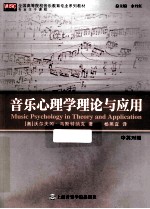

音乐心理学理论与应用 中英对照PDF电子书下载
- 电子书积分:14 积分如何计算积分?
- 作 者:(德)马斯特纳克著
- 出 版 社:上海:上海音乐学院出版社
- 出版年份:2014
- ISBN:9787806929070
- 页数:446 页
译文部分 3
第一章 心理学与音乐心理学 3
1.1 音乐心理学相关领域 4
1.1.1 心理学思想流派 4
1.1.2 心理学研究的焦点 13
1.2 个体、音乐及音乐教育 17
1.3 当代音乐心理学研究领域 20
第二章 音乐感知与审美体验 22
2.1 通感、文学与心理美学 22
2.2 心理声学和神经心理学 24
2.3 音乐格式塔 26
2.4 音乐感知和“美”的进程 28
2.5 听觉与环境 30
2.6 音乐记忆与绝对音高 32
第三章 音乐教育应关注之要点 33
3.1 音乐教育作为文化和社会现象 33
3.2 影响音乐学习的四种条件 35
3.2.1 天赋与基因/遗传条件 35
3.2.2 音乐学习的心理—生理条件 37
3.2.3 学习技巧与策略 47
3.2.4 学习的外部条件 53
3.3 基本变量实体之人格心理学理论 57
第四章 音乐创作与表演 59
4.1 音乐能力与音乐作品 59
4.2 知识与技巧 60
4.3 真实性与个性 61
4.4 创造与革新 64
4.5 社会文化功能与社会交流 66
4.6 学习与比赛 68
第五章 作为中小学课程内容的音乐心理学 70
5.1 教授音乐心理学的根据 70
5.2 课堂实践 73
5.2.1 简单的实验 74
5.2.2 主动争取和创造学习机会 75
5.2.3 听觉神经生理学 76
第六章 在校学生的行为和心理问题 78
6.1 学生发育阶段的“攻击性”行为及教育的作用 78
6.2 学校和教师作为深蕴心理象征 79
6.3 成长和学习障碍 81
6.4 儿童受虐待和被忽视的问题 85
6.5 文化适应问题 87
6.6 行为问题和行为障碍 89
6.7 心理障碍和精神障碍 93
6.8 融合教育 95
第七章 特殊音乐教育 104
7.1 诊断及适用范围 104
7.2 特殊音乐教育的学派和观念 107
7.2.1 奥尔夫音乐治疗 107
7.2.2 诺道夫-罗宾斯音乐治疗 109
7.2.3 维罗尼卡项目 111
7.2.4 声音功效(Sound Work) 113
第八章 音乐治疗 114
8.1 音乐治疗的结构与特征 115
8.2 音乐治疗的流派与方法 117
8.2.1 多样联合表达疗法及音乐格式塔疗法 117
8.2.2 声音功效 119
8.2.3 民族音乐治疗 129
第九章 音乐心理学研究方法 134
9.1 哲学方法 134
9.2 现象学研究方法 135
9.3 实证方法 138
9.3.1 数据和应用范围 138
9.3.2 描述性统计分析 141
9.3.3 统计测试 142
9.3.4 研究设计 152
9.3.5 数据解读 153
9.3.6 定义,数据获取工具和测试 153
9.4 神经心理学研究方法 156
第十章 神经心理学基本原理 161
10.1 脑的结构与功能 161
10.2 听觉系统 163
10.3 感知系统与感知统合 166
10.4 运动系统 169
10.5 认知能力 176
10.6 情绪/情感 176
10.7 记忆 180
10.8 创造力 181
10.9 马斯特纳克转换定理 182
后记——意犹未尽的话&沃尔夫冈·马斯特纳克 184
原文部分 187
Foreword 187
1 Psychology and Music Psychology 189
1.1 Disciplines of Music Psychology 190
1.1.1 Psychological Schools of Thought 190
1.1.2 Psychological Foci 202
1.2 Man,Music and Music Education 208
1.3 Fields of Contemporary Music Psychology 212
2 Perception and Aesthetic Experience 215
2.1 Common Sense,Literature and Psychological Aesthetics 215
2.2 Psychoacoustics and Neurophysiology 217
2.3 Musical Gestalt 220
2.4 Processing of Perception and Beauty 223
2.5 Ear and Environment 226
2.6 Musical Memory and the Mystery of the Absolute Pitch 229
3 Factors of Musical Learning 231
3.1 Music Education as a Cultural and Social Phenomenon 231
3.2 Four Domains Influencing Musical Learning 234
3.2.1 Talent and Genetic/Hereditary Conditions 234
3.2.2 Psycho-physiological Conditions 237
3.2.3 Learning Techniques and Strategies 253
3.2.4 External Conditions 262
3.3 The Personal ity-Psychological Theory of Basic Variable Entities 267
4 Professional Skills:Composition and Interpretation 270
4.1 Musicianship and Musical Output 271
4.2 Techniques and Knowledge 272
4.3 Authenticity and Individuality 274
4.4 Creativity and Innovation 277
4.5 Socio-cultural Functions and Communication 279
4.6 Studies and Competitions 283
5 Teaching Music Psychology at School 285
5.1 Four Reasons for Teaching Music Psychology 286
5.2 Insights into Classroom-Practise 291
5.2.1 Easy Experiments 291
5.2.2 Air China,hello 293
5.2.3 The Neurophysiology of Hearing 294
6 Behavioural and Mental Problems in Classroom-Education 297
6.1 Developmental Aggressiveness and Educational Frames 297
6.2 School and Teacher as Depth-psychological Symbols 299
6 3 Developmental and Learning Problems 301
6.4 Abuse and Neglect 307
6.5 Acculturation Problems 311
6.6 Behavioural Problems and Disorders 313
6.7 Mental and Psychiatric Disorders 318
7 Special Music Education 335
7.1 Diagnosis and Domains 335
7 2 Schools and Concepts of Special Music Education 339
7.2.1 Orff-Music-Therpapy 340
7.2.2 Nordoff-Robbins Music Therapy 343
7.2.3 The Veronika-Project 346
7.2.4 Sound Work 348
8 Music Therapy 350
8.1 Structures and Features of Music Therapy 351
8.2 Schools and Methods 355
8.2.1 Intermodal Expressive Therapy and Music Gestalt-Therapy 355
8.2.2 Sound Work 358
8.2.3 Ethno-Music-Therapy 373
9 Methods of Music Psychological Research 379
9.1 Philosophical Methods 379
9.2 Phenomenological Methods 380
9.3 Empirical Methods 385
9.3.1 Data and Ranges 386
9.3.2 Descriptive Statistics 389
9.3.3 Statistical Tests 391
9.3.4 Research Settings 402
9.3.5 Interpretation 403
9.3.6 Definitions,Data-gaining Tools and Tests 404
9.4 Neuro-psychological Methods 408
10 Neuro-psychological Basics 414
10.1 Parts and Functions 415
10.2 The Auditory System 417
10.3 Sensory System and Sensory Integration 422
10.4 The Motor System 426
10.5 Cognition 434
10.6 Emotion 434
10.7 Memory 440
10.8 Creativity 441
10.9 Mastnak's Transition-Theorem 443
A Word at No-End 445
- 《SQL与关系数据库理论》(美)戴特(C.J.Date) 2019
- 《钒产业技术及应用》高峰,彭清静,华骏主编 2019
- 《现代水泥技术发展与应用论文集》天津水泥工业设计研究院有限公司编 2019
- 《联吡啶基钌光敏染料的结构与性能的理论研究》李明霞 2019
- 《情报学 服务国家安全与发展的现代情报理论》赵冰峰著 2018
- 《学前儿童发展心理学 第2版》刘万伦主编;王文秀,甘卫群,刘万伦编写人员 2019
- 《英汉翻译理论的多维阐释及应用剖析》常瑞娟著 2019
- 《新课标背景下英语教学理论与教学活动研究》应丽君 2018
- 《党员干部理论学习培训教材 理论热点问题党员干部学习辅导》(中国)胡磊 2018
- 《大学生心理健康与人生发展》王琳责任编辑;(中国)肖宇 2019
- 《中风偏瘫 脑萎缩 痴呆 最新治疗原则与方法》孙作东著 2004
- 《水面舰艇编队作战运筹分析》谭安胜著 2009
- 《王蒙文集 新版 35 评点《红楼梦》 上》王蒙著 2020
- 《TED说话的力量 世界优秀演讲者的口才秘诀》(坦桑)阿卡什·P.卡里亚著 2019
- 《燕堂夜话》蒋忠和著 2019
- 《经久》静水边著 2019
- 《魔法销售台词》(美)埃尔默·惠勒著 2019
- 《微表情密码》(波)卡西亚·韦佐夫斯基,(波)帕特里克·韦佐夫斯基著 2019
- 《看书琐记与作文秘诀》鲁迅著 2019
- 《酒国》莫言著 2019
